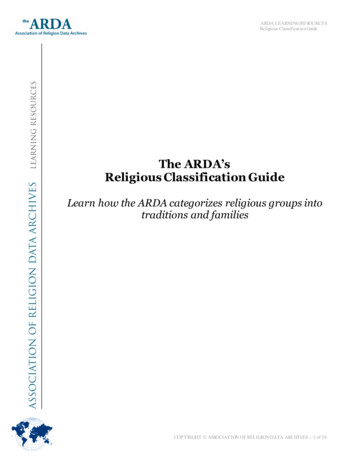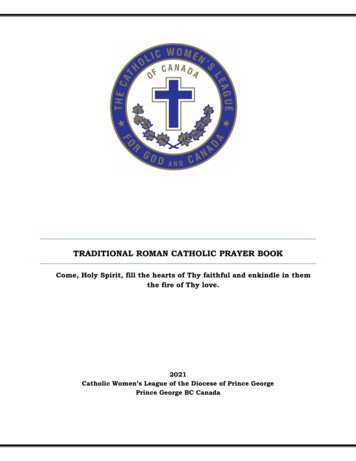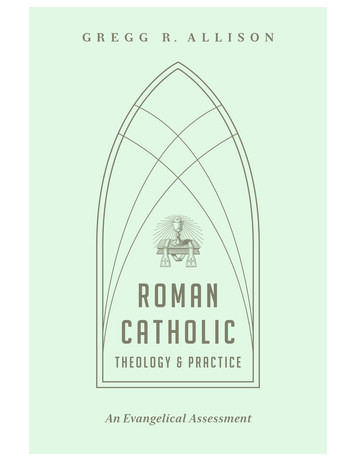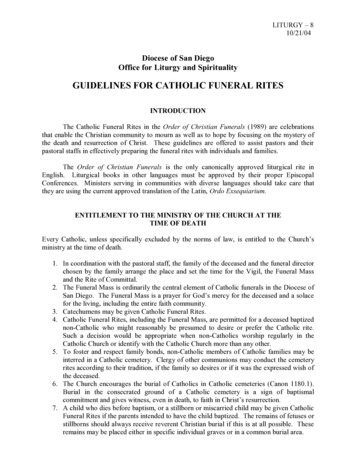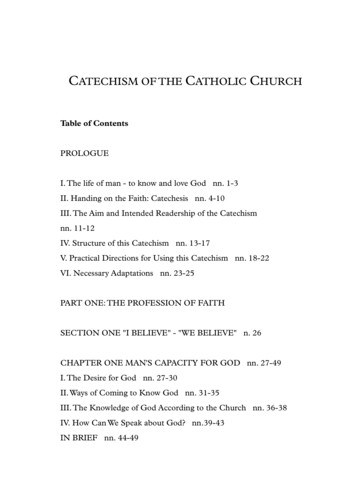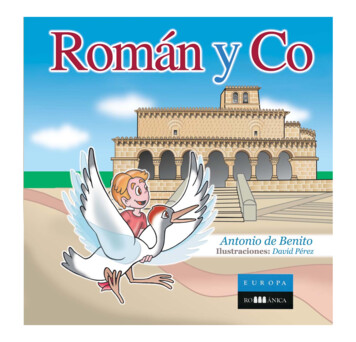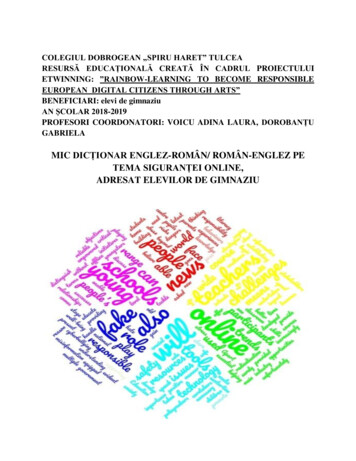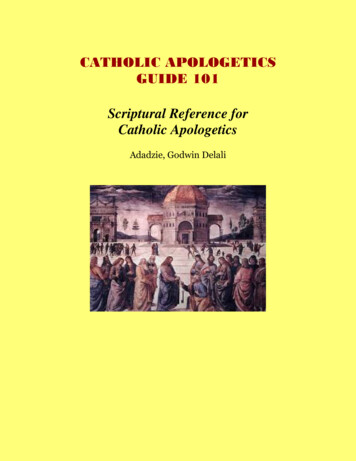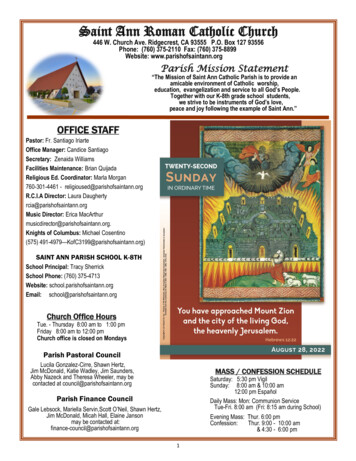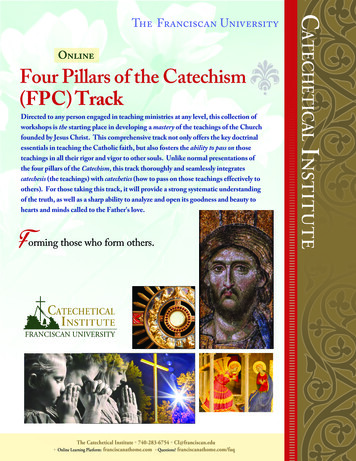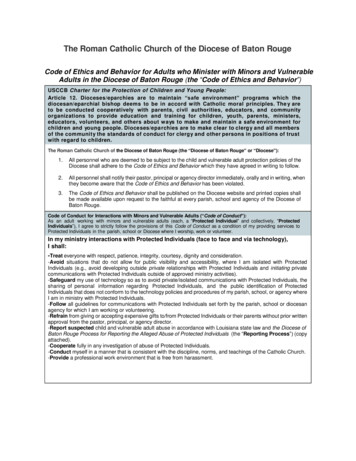
Transcription
The Roman Catholic Church of the Diocese of Baton RougeCode of Ethics and Behavior for Adults who Minister with Minors and VulnerableAdults in the Diocese of Baton Rouge (the “Code of Ethics and Behavior”)USCCB Charter for the Protection of Children and Young People:Article 12. Dioceses/eparchies are to maintain “safe environment” programs which thediocesan/eparchial bishop deems to be in accord with Catholic moral principles. The y areto be conducted cooperatively with parents, civil authorities, educators, and communityorganizations to provide education and training for children, youth, parents, ministers,educators, volunteers, and others about w ays to make and maintain a safe environment forchildren and young people. Dioceses/epa rchies are to make clear to clerg y and all membersof the communit y the standards of conduct for clerg y and other persons in positions of trustwith regard to children.The Roman Catholic Church of the Diocese of Baton Rouge (the “Diocese of Baton Rouge” or “Diocese”):1.All personnel who are deemed to be subject to the child and vulnerable adult protection policies of theDiocese shall adhere to the Code of Ethics and Behavior which they have agreed in writing to follow.2.All personnel shall notify their pastor, principal or agency director immediately, orally and in writing, whenthey become aware that the Code of Ethics and Behavior has been violated.3.The Code of Ethics and Behavior shall be published on the Diocese website and printed copies shallbe made available upon request to the faithful at every parish, school and agency of the Diocese ofBaton Rouge.Code of Conduct for Interactions with Minors and Vulnerable Adults (“Code of Conduct”):As an adult working with minors and vulnerable adults (each, a “Protected Individual” and collectively, “ProtectedIndividuals”), I agree to strictly follow the provisions of this Code of Conduct as a condition of my providing services toProtected Individuals in t he parish, school or Diocese where I worship, work or volunteer.In my ministry interactions with Protected Individuals (face to face and via technology),I shall:-Treat everyone with respect, patience, integrity, courtesy, dignity and consideration.-Avoid situations that do not allow for public visibility and accessibility, where I am isolated with ProtectedIndividuals (e.g., avoid developing outside private relationships with Protected Individuals and initiating privatecommunications with Protected Individuals outside of approved ministry activities).-Safeguard my use of technology so as to avoid private/isolated communications with Protected Individuals, thesharing of personal information regarding Protected Individuals, and the public identification of ProtectedIndividuals that does not conform to the technology policies and procedures of my parish, school, or agency whereI am in ministry with Protected Individuals.-Follow all guidelines for communications with Protected Individuals set forth by the parish, school or diocesanagency for which I am working or volunteering.-Refrain from giving or accepting expensive gifts to/from Protected Individuals or their parents without prior writtenapproval from the pastor, principal, or agency director.-Report suspected child and vulnerable adult abuse in accordance with Louisiana state law and the Diocese ofBaton Rouge Process for Reporting the Alleged Abuse of Protected Individuals (the “Reporting Process”) (copyattached).-Cooperate fully in any investigation of abuse of Protected Individuals.-Conduct myself in a manner that is consistent with the discipline, norms, and teachings of the Catholic Church.-Provide a professional work environment that is free from harassment.
CODE OF ETHICS AND BEHAVIOROF THE DIOCESE OF BATON ROUGEPage 2 of 5REVISION OF DECEMBER 31, 2019Code of Conduct:As an adult working with Protected Individuals, I promise to strictly follow the provisions of the Code of Conduct as acondition of my providing services to Protected Individuals in the parish, school or Diocese where I worship, work orvolunteer.In my ministry interactions with Protected Individuals (face to face and via technology)I shall not:-Smoke, vape or use tobacco or vaping products in the presence of Protected Individuals.-Use, possess, or be under the influence of alcohol at any time while working with Protected Individuals.-Use, possess, or be under the influence of illegal drugs at any time.-Pose any health risk to Protected Individuals.-Strike, spank, shake, or slap Protected Individuals.-Humiliate, ridicule, threaten, or degrade Protected Individuals.-Use any discipline that frightens or humiliates a Protected Individual or a group of Protected Individuals.-Make any type of statement about a Protected Individual’s body type, shape, build, or looks.-Make any type of statement that degrades or puts down in way any other adult, minor or group of people,including without limitation any type of racial joke, slur or degrading comment about any race, person orgroup of people.-Touch a Protected Individual in a sexual or other inappropriate manner.-Plan or conduct any type of youth-oriented event in the name of the Diocese, other than those that areapproved, planned, and conducted by my church and/or school ministry team.-Share with a Protected Individual anything about my own sexual history or any other past or presentexperience that crosses the boundary between public and private. (Catechists who are responsible forteaching Catholic sexual morality must be certified through the diocesan human sexuality course.)-Share a room (i.e., stay overnight in the same room) with a Protected Individual or group of ProtectedIndividuals during any type of event.-Allow a Protected Individual or group of Protected Individuals to stay overnight in my own home unless dueto a shared friendship between my child and another adult’s child.-Take improper advantage of a counseling and/or authoritative relationship for my own benefit.-Manufacture, possess, or distribute child pornography.-View movies or other similar materials containing inappropriate content with or in the presence ofProtected Individuals.-Listen to music that is degrading of any person or race, or of one’s sexuality, with or in the presence ofProtected Individuals.-Contribute to the delinquency of a Protected Individual as prohibited by Louisiana law.-Enter into any type of private communication with a Protected Individual that is not within the scope of myministry, or any communication that would undermine the parent-child relationship, or serve to foster aninappropriate relationship with a Protected Individual.-Request confidentiality of one or more Protected Individuals.*-Promise confidentiality to one or more Protected Individuals.*-Abuse or neglect a minor or vulnerable adult as prohibited by Louisiana law.*See also “Communications and Confidentiality” section below.Appropriate Physical Contact Allowed While Working with Protected IndividualsI understand that the following forms of physical contact are appropriate while workingwith Protected Individuals:-Handshakes and “High Fives.”-Brief hugs (when initiated by a Protected Individual).-Hand holding (during group prayer).-Contact that is a component of an acceptable group activity (such as an icebreaker, group prayer service,or sporting activity).
CODE OF ETHICS AND BEHAVIOROF THE DIOCESE OF BATON ROUGEPage 3 of 5REVISION OF DECEMBER 31, 2019Inappropriate Physical Contact Not Allowed While Working with Protected Individuals:I understand that the following forms of physical contact are not allowed while workingwith Protected Individuals:-Kissing or prolonged embraces involving a Protected Individual.-Giving or receiving any type of massage involving a Protected Individual.-Showering or bathing with a Protected Individual.-Allowing a Protected Individual to sit on one’s shoulders or lap.-Fondling, petting, or any type of genital contact involving a Protected Individual.-Leaning against a Protected Individual (when seated or standing).Communications and Confidentiality with Protected Individuals in MinistryPrivate communication with a Protected Individual is defined as any type or form of communicationthat takes place apart from an appropriate and approved ministry setting. Therefore, adults in ministrywith Protected Individuals shall not enter into any type of private communication with a ProtectedIndividual that is not within the scope of their ministry, or any communication that would underminethe parent-child relationship or serve to foster an inappropriate relationship with a ProtectedIndividual.Types of Communications (Verbal/Written) While Working with Protected Individuals:It is normal for an adult in ministry to enter into a spontaneous conversation with a Protected Individual.However, adults shall consider that some issues, even if shared spontaneously in open conversation, must bebrought to the attention of a Protected Individual’s parents in the case of a minor, or guardian in the case ofa Vulnerable Adult.Adults in ministry with Protected Individuals shall follow all communications/technology guidelines and policiesestablished by the parish, school or diocesan agency where they worship, work or volunteer.Adults in ministry with Protected Individuals are obligated to read thoroughly any written communication thatthe adult receives from a Protected Individual. If it is appropriate to ask a Protected Individual to make journalentries as a part of the religious education process, then adults are also obligated to read and take seriouslysuch entries and to respond to them in keeping with the standards stated in this Code of Ethics and Behavior,particularly if the information shared is that of the alleged abuse of that Protected Individual or if the informationleads the adult to suspect that a Protected Individual is at risk of harming him or herself or others.Confidentiality in ministry with Protected Individuals has an appropriate place. However, no communicationbetween adults and the Protected Individuals to whom they minister is protected by privilege (i.e., such as thatwhich exists between a priest and penitent in sacramental confession, a lawyer and client, or a doctor andpatient.) Adults will, therefore, commit themselves to a specific standard regarding communications withProtected Individuals. In settings such as small groups during a retreat, an adult small group leader mayencourage the group to keep what is shared in the group confidential, unless a member of the group sharesinformation that leads the adult to suspect that a Protected Individual is at risk of harming him or herself orothers. Such information shall not be kept confidential. In cases of alleged or suspected abuse, diocesanpersonnel shall follow the Reporting Process.Diocesan Requirements/Certification to Work in Ministry with Protected IndividualsI understand and agree that I shall complete the following requirements prior to working in ministrywith Protected Individuals:-Obtain a Criminal Background Check (to comply with state and federal laws).-Complete promulgated diocesan training on Recognizing and Reporting Abuse.-Read, sign and submit the Code of Ethics and Behavior acknowledgment form.-Complete the appropriate diocesan EAPPS application.
CODE OF ETHICS AND BEHAVIOROF THE DIOCESE OF BATON ROUGEPage 4 of 5REVISION OF DECEMBER 31, 2019THE DIOCESE OF BATON ROUGEWhen theAccused is a:Priest, Deacon,Religious Brotheror Sister, orSeminarianEmployee of theDiocese, Volunteerin Ministry orOther personLicensedDaycareStaffProcess for Reporting the Alleged Abuse of a Protected IndividualStep 1: Mandated Reporter calls local Police or Sheriff’sDepartmentStep 2: Mandated Reporter alerts Diocesan VictimAssistance Coordinator via the 24-Hour VAC HotlineStep 3: Victim Assistance Coordinator alerts theappropriate Diocesan Chancery OfficialStep 1: Mandated Reporter makes report to appropriate CivilAuthority (Abuse of minor within the home:Call Department of Children and Family Services; Abuseof minor outside of the home: Call local Police orSheriff’s Department; Abuse of Vulnerable Adult: Calllocal Police or Sheriff’s Department and appropriateLouisiana Vulnerable Adult Services)Step 2: Mandated Reporter alerts his or her immediatesupervisorStep 3: Supervisor alerts appropriate Department Head andthe Director, Office of Child and Youth ProtectionStep 4: If abuse is sexual in nature, call the diocesan VictimAssistance Coordinator via the 24-Hour VictimAssistance Hotline when accused is a diocesanemployee, volunteer or other personStep 1: Mandated Reporter makes report to Department ofChildren and Family ServicesStep 2: Mandated Reporter alerts his or her immediatesupervisorStep 3: Supervisor alerts appropriate Department Head andthe Director, Office of Child and Youth Protection*Step 4: If abuse is sexual in nature, call the diocesan VictimAssistance Coordinator via the 24-Hour VictimAssistance HotlineDiocesan 24-Hour VictimAssistance Hotline(225) 242-0250Diocesan Office of Childand Youth Protection(225) 242-0202Diocesan Office ofHuman Resources(225) 387-0561Louisiana DepartmentDiocesanCatholicof ChildrenandFamilySchoolsOfficeServices State-Wide(225) 336-873524-HourHotline855-452-5437Louisiana AdultProtective Services(for vulnerable adultsages 18-59)1-800-898-4910Louisiana Department ofElderly ProtectiveServices(for vulnerable adultsages 60 and older)1-833-577-6532
CODE OF ETHICS AND BEHAVIOROF THE DIOCESE OF BATON ROUGEPage 5 of 5REVISION OF DECEMBER 31, 2019Acknowledgement of Receipt and Review of, a n d A g r e e m e n t t o C o m p l y w i t h , the Code ofEthics and Behavior, I n c l u d i n g t h e C o d e o f C o n d u c t and the Reporting Process*By signing where indicated below, I acknowledge that I have received, carefully read and fullyunderstand the attached Code of Ethics and Behavior for Adults who Minister w ith Minors andVulnerable Adults in the Diocese of Baton Rouge (“Code of Ethics and Behavior”), including theCode of Conduct f o r I n t e r a c t i o n s w i t h M i n o r s a n d V u l n e r a b l e A d u l t s ( “ C o d e o fC o n d u c t ” ) and the Process for Reporting the Alleged Abuse of a P r o t e c t e d I n d i v i d u a l( “ R e p o r t i n g P r o c e s s ” ) , and agree to comply with them in all respects, and to conduct myself andfulfill my ministerial responsibilities according to all of their provisions.I accept responsibility to carry out all of the provisions of the Code of Ethics and Behavior, includingthe Code of Conduct and the Reporting Process, and to refer any questions concerning them to myimmediate supervisor or the Diocesan Child Protection Officer for further clarification. I understandthat the Diocese of Baton Rouge reserves the right to change, modify, and/or revise any of theprovisions contained in them at any time.I acknowledge that the Diocese of Baton Rouge is relying upon my representations made herein andin the documents referenced above to allow me to minister to Protected Individuals as thereindefined.Diocesan Child Protection Officer:Amy J. CordonP.O. Box 2028Baton Rouge, LA 70821-2028(225) r SignatureDate SignedPRINT Full Name of Employee/Volunteer*This statement when signed and dated must be returned to the appointed ChildProtection Site Coordinator and placed in the signatory’s Child Protection file.
OF THE DIOCESE OF BATON ROUGE Page 4 of 5 REVISION OF DECEMBER 31, 2019 Em Diocesan Ca tholic Schools Office (225) 336-8735 When the Accused is a: THE DIOCESE OF BATON ROUGE Process for Reporting the Alleged Abuse of a Protected Individual Priest, Deacon, Religious Brother or Sister, or Seminarian pl oye e f th Diocese, oVolunteer in Ministry or


